Hamas dismisses Israeli media report on Haniyeh’s assassination in Tehran
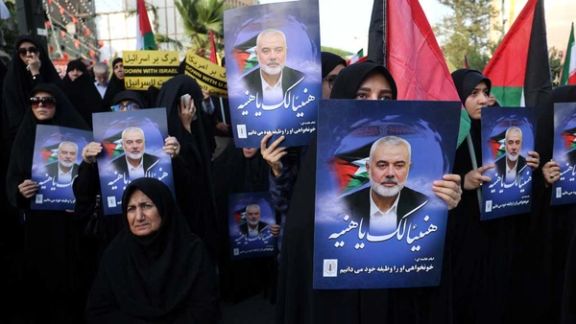
Hamas dismissed an Israeli media report about the details of the assassination of the Iran-backed group's leader Ismail Haniyeh in Tehran.

Hamas dismissed an Israeli media report about the details of the assassination of the Iran-backed group's leader Ismail Haniyeh in Tehran.
"The Israeli regime's claim that martyr Haniyeh was assassinated using a bomb at his official residence in Tehran is completely baseless," Hamas said in a statement.
The group added that joint investigations with Iranian security agencies revealed the operation involved a 7.5-kilogram guided missile that directly targeted Haniyeh's mobile phone.
On Saturday, Israel’s Channel 12 reported that an explosive device was planted in advance in Haniyeh's bedroom in the Neshat compound of the Revolutionary Guards, before an air conditioning malfunction almost jeopardized the entire operation.

In an interview with Saudi Arabia’s Al Arabiya, Syria’s new de-facto leader, Ahmed al-Sharaa, said he had expected a more positive engagement from Iran following the fall of the decades-long Assad government.
"We were expecting positive statements from Tehran”, the leader of Hay'at Tahrir al-Sham said as Tehran remains tight-lipped on what happens next. Syria had been a key route to arm its ally Hezbollah in Lebanon, and was strategically critical militarily with bases and military personnel stationed across Syria.
While he expressed hope that Tehran would scale back its military intervention in the region, he said that "a broad segment [of the country] aspires to a positive Iranian role in the region,” the Syrian population having seen both Iran and Russia heavily involved in Syrian affairs since the 2011 civil war.
Referring to the killing of an Iranian embassy worker and the storming of the Iranian embassy on December 8, when rebels took control of Damascus and President Bashar al-Assad fled to Moscow, he told Al Arabiya that the group’s military “did its duty towards the Iranian headquarters despite the injuries”.
It sparked a diplomatic fiasco in Tehran. Foreign ministry spokesman Esmaeil Baghaei said last week that Davood Bitaraf was killed by “terrorists”, shot in his vehicle in Damascus, saying that the Syrian transitional government is responsible for "identifying, prosecuting, and punishing the perpetrators of this crime.”
In a statement to the media, he said: ”The Ministry of Foreign Affairs is seriously pursuing the matter through appropriate channels and various diplomatic and international avenues.”
The new leader, a former member of Al Qaeda, has made no secret of his pleasure at reducing the influence of Iran in Syria, saying that since the fall of Assad, Syria's opposition had “set the Iranian project in the region back by 40 years”.
“By removing Iranian militias and closing Syria to Iranian influence, we’ve served the region’s interests—achieving what diplomacy and external pressure could not, with minimal losses,” he said, referring to Iran’s military allies which span the Middle East.
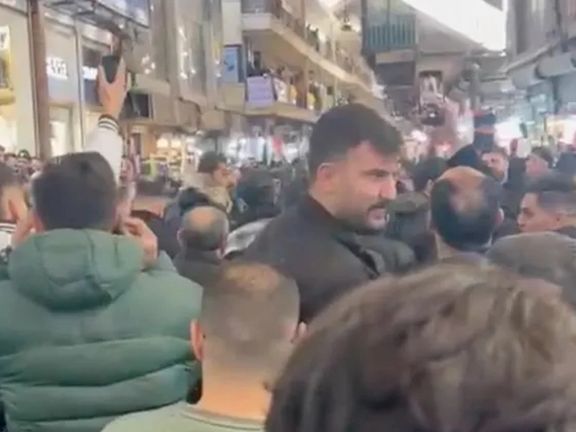
Business owners and employees in Tehran’s historic bazaar staged a rare strike on Sunday against runaway inflation and soaring foreign currency rates, spurring protests in other commercial hubs in the capital.
Unrest in Iran's historic heart of commerce reflects the bleak outlook of the country as it faces dire economic straits. In 1979, protests in the bazaar heralded the onset of the Islamic Revolution which toppled Iran's monarch.
The strike, which began with shoe sellers in the 15th Khordad area, quickly spread to other sectors.
Videos shared with Iran International show merchants in the bazaar chanting “Don’t be afraid, close up,” and “Brave merchants, support, support".
A fabric merchant who joined the protest cited the impact of surging raw material costs, exacerbated by the devaluation of Iran’s currency.
“With the dollar now above 810,000 rials, our expenses have skyrocketed,” the merchant said. “Many workshops have shut down, and even those still running are struggling to sell goods in such a sluggish market.”
The protests soon expanded to key commercial hubs, including Abbasabad Market and Baghe Sepahsalar, known for fabric and shoe vendors.
Hamidreza Rastgar, head of Tehran’s Chamber of Guilds, acknowledged the discontent among manufacturers.
"Producers fear that items priced at these exchange rates will simply be out of reach for most consumers,” he said.
The Iranian rial’s sharp depreciation has had ripple effects across the economy. For merchants, it has created an untenable mix of higher costs and reduced consumer demand as at least one third of Iran is now living below the poverty line.
Security forces were deployed to control the demonstrations and gatherings appeared to have subsided by the end of the day.
There were no immediate reports of violence, but the heavy presence of law enforcement forces highlighted the Islamic Republic's sensitivity to unrest in this economically vital area.
Iran's economy is in its worst state since the founding of the Islamic Republic in 1979, with US-led sanctions over its nuclear program, support for militant groups and arms transfers for Russia's war on Ukraine squeezing the country.

Iran's government has warned the country's ultra-hardliners and their vigilante groups of serious consequences if they continue to sow “discord” with their apparently growing protests against the President's new, more progressive policies.
Ali Zeynivand, the political deputy of Iran's Interior Ministry, told the Iranian Labour News Agency (ILNA) on Saturday that individuals behind recent protests against issues such as the easing of internet restrictions, have been summoned and cautioned.
“There have been discussions within the Ministry of Interior regarding the recent rallies,” Zeinivand said. Provincial governors have been instructed to take firm action against protests that could jeopardize national unity and solidarity. All rallies must have official permits in Iran, he added.
Zeynivand’s warning follows growing criticism from political figures and media outlets, who have pointed out that while political parties and groups are routinely denied permits for rallies, ultra-hardliner vigilantes continue to stage protests with impunity against the government whenever and wherever they wish.
It remains unclear whether the Interior Ministry’s move to curb the activities of vigilantes is driven by the President's admiinstration, a higher authority such as the Supreme National Security Council (SNSC), or is a direct directive from Supreme Leader Ali Khamenei whose policies guide Iran's key security ministries of interior, intelligence, and defense.
Ultra-hardliners have accused President Masoud Pezeshkian of colluding with Iran's enemies by advocating negotiations with the West to lift crippling sanctions that have devastated Iran's economy.
They also criticize him for what they say is undermining Islamic values by resisting demands to implement a new hijab law and for taking steps to ease internet restrictions.
The group of hardliners also hold Pezeshkian responsible for the lack of a military response to Israeli airstrikes on Iran in October, accusing him of delaying the so-called “True Promise 3” retaliation.
As they look to attribute blame, the president has also become the fall guy for the depreciation of the national currency and the ongoing power outages, which the government attributes to the previous administration’s failure to stockpile fuel for power plants adequately.
Vigilantes have a long record of attacking political meetings and universities, threatening and slandering top officials including presidents and government officials in street rallies and in their media over the years but their recent focus on Pezeshkian’s government has become particularly relentless now, the reformist Arman-e Melli newspaper wrote in an editorial Saturday.
The newspaper’s editorial referred to these actions as ultra-hardliners' “street maneuvers” to pressure the government.
Vigilantes, often linked to the Revolutionary Guards' Basij militia, were behind the high-profile attacks on the British embassy in November 2011 and the Saudi embassy in January 2016, both of which led to significant diplomatic crises for Iran.
Although the perpetrators were well-known to authorities, they were never held accountable for the extensive damage inflicted on Iran's international reputation and relations.
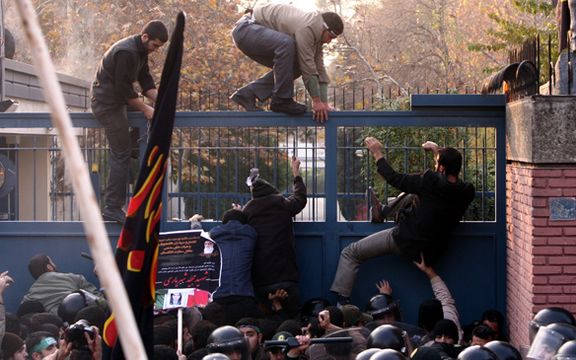
Earlier this week, ultra-hardliners linked to the Paydari (Steadfastness) Party and another group with close ties to the former nuclear negotiator Saeed Jalili announced plans to protest after Friday prayers on motorbikes against the government’s decision to unblock WhatsApp and Google Play. However, reports indicated that turnout for the protest was minimal, with only about a dozen participants.
“The question is, who has allowed them to have such power to be able to cause disruptions in the city, make baseless allegations against authorities, and to insult and threaten them,” the article asked while contending that Pezeshkian’s government will not be able to deal with ultra-hardliners and stop them from harming the system under the name of the revolution by talks and invitation to unity.
Iran's government is grappling with multiple crises, both domestic and international. Abroad, its military stand-off with Israel and the collapse of Bashar al-Assad's rule in Syria have thrown foreign policy into chaos. Direct attacks from Israel have seriously damaged Iran's defense systems while losing its stronghold in Syria has weakened its influence across the region.
Meanwhile, at home, economic challenges such as high inflation and the unprecedented depreciation of the national currency, serious energy shortages, and widespread popular discontent over issues like hijab enforcement and internet filtering still risk sparking further unrest.
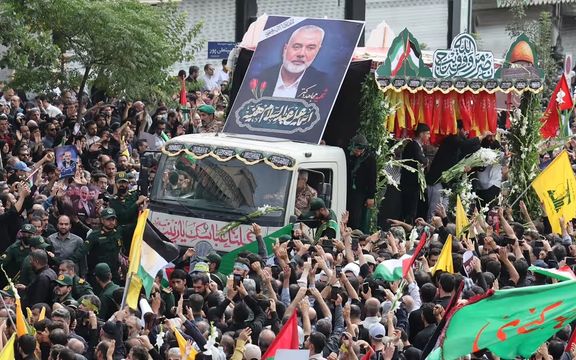
Just days after Israel admitted it had killed Hamas political chief Ismail Haniyeh in Tehran last summer, its intelligence service has revealed that the operation was nearly scuppered after a technical glitch in the site of the killing.
A report from Israel’s Channel 12 revealed that an explosive device was planted in advance in the bedroom of the secret Neshat compound of the Revolutionary Guards, before an air conditioning malfunction almost jeopardized the entire operation.
Haniyeh was guarded by the IRGC’s elite Ansar al-Mahdi unit, known for their expertise in hand-to-hand combat, staying in the IRGC’s Neshat compound, a top secret accommodation facility which hosts top government officials and foreign dignitaries.
Haniyeh slept in the same room around eight times, making the location ideal for an assassination but when the air conditioner in Haniyeh's room broke down, he was forced to leave after a bomb had been planted ready for the killing.
"The operation was on a tightrope," a senior security source told Channel 12. "There was a fear that his room would be replaced with another. Finally, they managed to fix the air conditioner, and he returned to his original room until the sky went up.”
A hole was blown through the outer wall, shaking the whole compound at around 1:30 am, with a massive explosion.
A first aid team on the compound ran to the site and Haniyeh’s bodyguard found his body bleeding on the floor. The report says he fell to his knees and burst into tears in the dramatic moment the group, designated terrorists by countries including the US and UK, began to see its top leadership crumbling.
One of the boldest and most complex operations of its kind, Israel had ruled out killing Haniyeh in Qatar for fear of jeopardizing hostage negotiations which Qatar was mediating, while killing him in Turkey, the group’s other outpost, risked the wrath of both Turkey and its ally Russia.
After October 7, documents found in Gaza revealed Haniyeh, once considered less a target than the likes of Hamas’s Gaza leader, Yahya Sinwar, revealed the leader in exile was closely tied to the plans which led to the most deadly single day for Jews since the Holocaust.
Over the years, he had evaded multiple assassination attempts, and Iran was an unlikely location, but the channel 12 report has shown that plans were underway for an operation to take place while Haniyeh was attending the funeral of Ebrahim Raisi, killed in a mysterious helicopter crash in May.
That plan was shelved due to concerns of killing civilians, and decided to take place after the President’s inauguration, so as not to overshadow the incoming president’s state ceremony.
Haniyeh was the critical link in building Hamas’s ties with Iran since he took over as the political chief in 2017. In March 2022, Haniyeh revealed that the Islamic Republic paid a total of $70 million to Hamas to help it develop missiles and defense systems, in an interview with Al Jazeera.
The July 31 killing led to huge unrest among Iran’s security chiefs, with the head of the IRGC’s Quds Force, Esmail Qaani, disappearing and later reappearing amid the embarrassment. Now, Iran’s top leaders have yet to discover and reveal the source of the infiltration, leaving deep suspicion in the heart of Iran’s once impenetrable IRGC.
Haniyeh was replaced by Gaza leader Yahya Sinwar, who took over as the group’s political head, shortly before he was also killed by Israel in October, just over a year since the October 7 attacks he had masterminded.
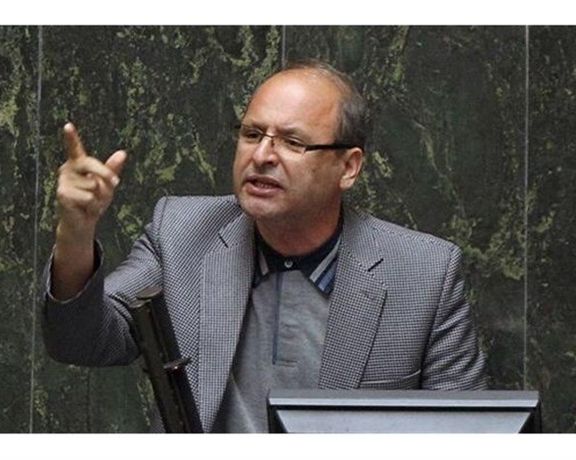
An Iranian lawmaker backed Tehran's plans to target Israel and warned that any Israeli attack on Iran's nuclear facilities would legitimize Tehran advancing toward nuclear weapons development.
“If Israel conducts a military strike against Iran's nuclear facilities, it effectively grants us the permission to move toward developing nuclear weapons," Ahmad Bakhshayesh Ardestani, a member of the National Security and Foreign Policy Committee of Iran’s parliament, told Didban news website in Tehran.